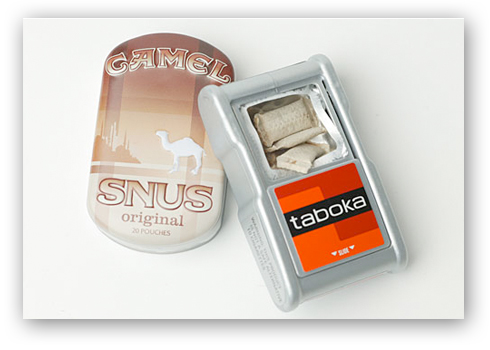- 12/1/2007
- web-based article
- Wendy Koch
- USA Today (www.usatoday.com)

The Marlboro Man, that cigarette-smoking icon of the tobacco industry, is more than a half-century old.
If he were conceived today, there might not be just a cigarette dangling from his mouth. He might also have, tucked into his pocket, a cellphone-size container holding a dozen pouches of snus
Snus?
It rhymes with “goose,” (cynics might say “noose”), and is a Swedish type of smokeless tobacco that’s not your grandfather’s dip or chew. Snus comes in teabag-like pouches that a user sticks between the upper lip and gum, leaves there for up to 30 minutes and discards without spitting.
As no-smoking laws sweep the nation and cigarette sales continue to fall, Big Tobacco is alarming the public health community by devising other ways to try to make tobacco appealing. With smokeless products representing the only booming part of the U.S. tobacco market, snus is an effort to boost sales with a product that — unlike most smokeless ones — doesn’t require users to spit out the residue.
Snus also represents something more: an attempt to move smokeless tobacco beyond stereotypical users such as baseball players and rodeo cowboys, and into offices or restaurants where people want a nicotine fix but can’t light up.
“This is a growth strategy for us,” says Bill Phelps, spokesman for Philip Morris USA, the nation’s biggest tobacco company and maker of Marlboro, the top-selling cigarette. In Dallas this month, Philip Morris is launching its first smokeless product with a cigarette brand name: Marlboro Snus.
R.J. Reynolds, second in U.S. tobacco sales, is expanding tests of its Camel Snus from two cities to eight, which will include Dallas this month. Its ads have a “pleasure for wherever” tagline and a playful tone. Its “abridged guide to snusing” says, “Picture yourself stuck in the center seat 44B of an airplane: You can mope, or you can Snus.”
Public health advocates aren’t smiling.
Although some say smokeless tobacco poses fewer health risks than cigarettes, they note that it has been linked to various types of cancer and warn against using any tobacco product.
“What on the surface looks promising could turn out to be a public health disaster,” says Gregory Connolly, director of tobacco control research at Harvard School of Public Health.
He says the products are still addictive, and unless the Food and Drug Administration can regulate tobacco, consumers won’t know what’s truly in snus. A bill that would give the FDA such authority passed a U.S. Senate panel Wednesday and is gaining co-sponsors in the U.S. House.
Under laws in every state, snus and other tobacco products may not be sold to anyone younger than 18. But many health advocates see the new smokeless alternatives as an attempt to create a new generation of tobacco users.
Snus will “increase the number of people who use tobacco,” says Matthew Myers, president of the Campaign for Tobacco-Free Kids. “It’s market protection. This way, the big companies win no matter what tobacco products people use.”
Link to article: http://www.usatoday.com/news/nation/2007-08-06-snus_n.htm

Leave A Comment
You must be logged in to post a comment.